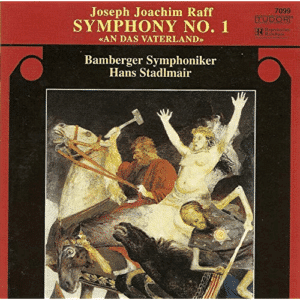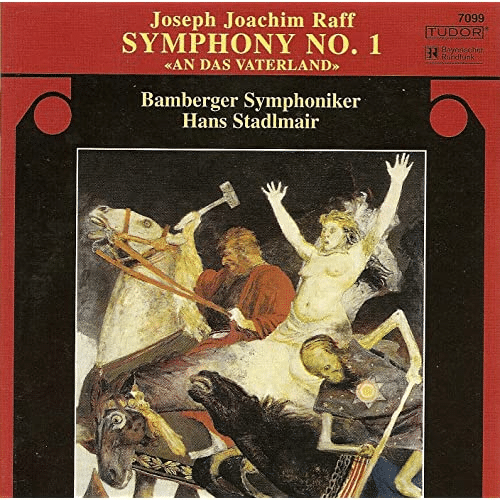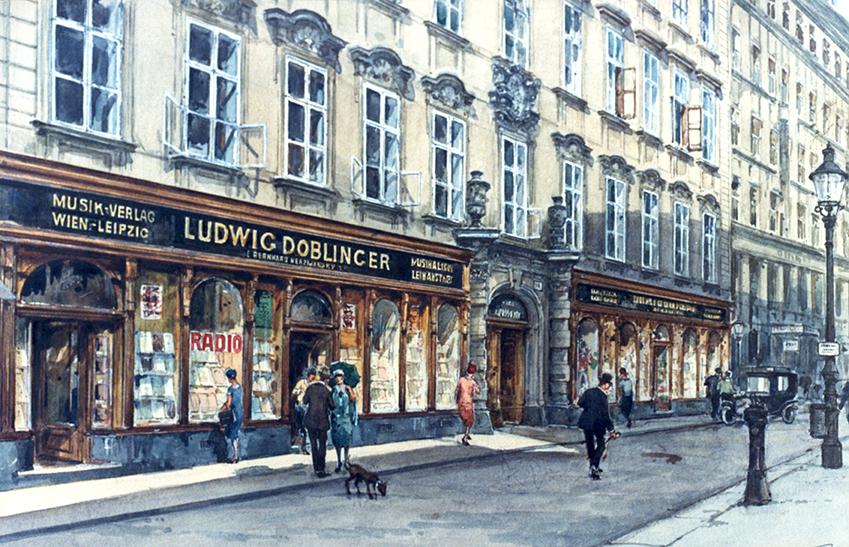What is the meaning of this record cover?
OrchestrasThe blonde is naked and the bloke appears to be wearing a yellow star.
This is supposed to illustrate the first symphony of Joachim Raff, a German-Swiss composer who lived from 1822 to 1882.
How, exactly?

The symphony is titled ‘to the Fatherland’.






Ich raff’s nicht.
even the horses are like, wtf, get me off this cover now
The Swiss label Tudor have issued 17 or so albums of Raff’s music all of which have cover art by Swiss painter Arnold Boecklin. From what I can tell it’s a random pairing of Swiss art and music with no apparent connection.
==What is the meaning…the blond is naked
To grab the attention of elderly bloggers / music reviewers
https://de.m.wikipedia.org/wiki/Der_Krieg_(Böcklin,_Dresden)
That’s the equally depressing other one.
This shows them both: https://en.wikipedia.org/wiki/War_%28B%C3%B6cklin_painting%29
Der Krieg – isn’t a certain relevance to Das Vaterland obvious?
War wielding a hammer = the god Thor (in the usual Four Horsemen representations it is a sword).
The 8-pointed yellow circle may represent the sun, among the other stars and planets on the black cloak of Death (he has a scythe in the fuller image).
The terrifying semi-naked lady that caught NL’s eye, Pestilence, is quite obviously spreading venereal disease – a common effect of War.
All this might put one off listening to Raff! Was that the intention?
Maybe they should start putting Hunter Biden art of the covers instead.
This obviously is an allegory on the battle of Stalingrad. The hammer represents strength and masculinity, wielded and the strong arms of the red army. His gaze merciless, watching over a neverending…
Just kidding. That’s war, plague, and death. It’s a painting from Böcklin painted in… thinking… failing… googling… 1896. I never liked Böcklin. Too depressing.
Probably it was chosen because Böcklin was a contemporary of Raff. And Swiss.
I’m also confident that you already put much more thought into it than whoever had the poor taste of choosing it for that cover.
For any German-Swiss “Fatherland” is hell on Earth.
An eternal war for unity in diversity.
It’s the unfinished second version of Böcklin’s Der Krieg (War). Supposed to depict War, Pestilence, and Death, (three riders) riding through a medieval town. It may have been used because the fourth movement of the Symphony is supposed to describe German disunity.
Böcklin for whatever reason painte multiple versions of some of the same paintings – his Isle of the Dead (set to music by Reger and Rachmaninov but it may be they each set different versions to music) being just one example, with three or four versions, and La Guerre/War being another with two.
War, plague and death were Böcklin’s common topics. N.L.’s bloke who appears to be wearing a yellow star is the Black Death, holding a scythe. His skin is withered, rotting, and clings to the bones
And it’s not just a yellow star, N.L., it is the sun. Remember in Revelations that The Fourth Plague was a blazing, scorching sun that killed the crops and caused men to blaspheme during their suffering. Albert Camus’ The Plague continues this linking of the hot sun with the plague and with death and suffering.
The plague, like the sun in Revelations, was viewed as a punishment, and clearly that is how Böcklin depicts it.
Off topic, this portion of Revelations is getting fresh attention from fundamentalist believers as an explanation for climate change.
So what’s all that got to do with Raff and his prize-winning symphony?
Maybe nothing, as Peter surmises, just using Böcklin paintings for covers and it was La Guerre’s turn. Rob mentions the fourth movement depicting German disunity as a possible explanation. Maybe somebody at Tudor records was slyly inserting the thought that this “vaterland” stuff was not going to end well for Europe and Germany, but was greatly pleasing to Mr. Death. Or perhaps Mr. Death, being a tall slender man, is a fitting symbol for someone named Raff. Now that I know is a stretch.
Stadlmair was a very good conductor, and not a bad composer either. I had him (and the soloist) autograph my copy of the Bach Concerto in E after hearing him perform it with violinist Lukas David, who had recorded Stadlmair’s Violin Concerto.
Perfect answer, thank you.
In art history class they might have called this “Symbolist”.
But unless you’re in on the symbols you can’t decode it.
But what does the yellow star on the bloke stand for?
Antisemitism?
No. If you had othered to look through the other comments, you would have found some answers.
‘bothered to look’
Here is the music (with a less disorienting picture):
https://www.youtube.com/watch?v=U1dcn2mey8E
A kind of classicism à la Mendelssohn with more romantic touches.
He was a diverse composer far ahead of his time: when director of the conservatory in Franfurt, he set-up a composition course specially for women.
https://en.wikipedia.org/wiki/Joachim_Raff
The painting is “War” by Arnold Bocklin, a Swiss painter roughly contemporary with Raff. Raff’s First Symphony was described this way: Raff uses extensively a melody composed in 1825 by Gustav Reichardt for Ernst Moritz Arndt’s poem Was ist des Deutschen Vaterland?.[1]
According to Helen Raff’s biography of her father, “The first three movements are supposed to show German life and existence, the fourth describes German disunity.” She further adds: “The fifth movement begins with a lament on the destiny of greater Germany and then proceeds to develop prophetic visions of future unity and majesty.” Joachim Raff’s note about the symphony states “Here the composer felt himself permitted the use of a motive not original with him … as a symbol.”[1]
Hitler was a fan of Bocklin’s work and owned (or stole?) 11 paintings.
The figure of death appears with a sun only in the version where three figures are riding over a medieval town, indicating the plague as well as disunity.
I suppose the choice of painting is a commentary on the dangers of (German) patriotism.
Do musicians have a voice in design of records with their performances?
In the days of vinyl where there was scope for detailed artwork It would have peaked my interest. In smaller/ non existent formats it would seem a bit confusing.
To change the subject slightly, what do people think of Raff’s symphonies. I have enjoyed the first two and the Thuringer Suite coupled with Symphony No. 2. Not game changers like Mahler symphonies, but well put together and Raff keeps the music moving along.
I imagine Böcklin’s copyright was up and the first to come up that hasn’t been used for a music cd…